Last Updated on April 18, 2024
TypeScript is an open-source programming language developed and maintained by Microsoft. It is a strict syntactical superset of JavaScript, and adds optional static typing to the language. Use existing JavaScript code, incorporate popular JavaScript libraries, and call TypeScript code from JavaScript.
TypeScript compiles to plain JavaScript code which runs on any browser, in Node.js, or in any JavaScript engine that supports ECMAScript 3 (or newer).
TypeScript offers support for the latest JavaScript features, including those from ECMAScript 2015 and future proposals, like async functions and decorators, to help build robust components.
TypeScript is published under the Apache License 2.0.
Here’s our recommended free books that’ll help you master TypeScript.
1. TypeScript Deep Dive by Basarat Ali Syed
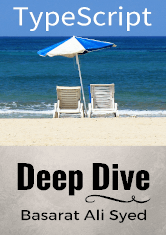 TypeScript Deep Dive is billed as definitive guide to TypeScript. There’s good coverage of the language, explaining particularly well TypeScript’s type system.
TypeScript Deep Dive is billed as definitive guide to TypeScript. There’s good coverage of the language, explaining particularly well TypeScript’s type system.
Dive into all the details that a JavaScript developer needs to know to be a great TypeScript developer. There’s tips, style guide, and more.
The book is published under an open source license. There are editions available for EPUB, PDF, and MOBI.
It’s been translated into Chinese, Filipino, Italian, Japanese, Korean, Portuguese, Russian, and Spanish.
2. TypeScript for C# Programmers by Steve Fenton
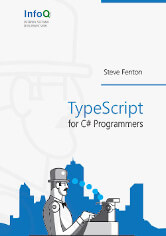 This book is aimed at .NET programmers and explains key concepts as well as similarities and differences between TypeScript and C#.
This book is aimed at .NET programmers and explains key concepts as well as similarities and differences between TypeScript and C#.
There is a quick start guide in the first chapter that introduces the syntax.
The later chapters include deep dives into the type system, memory management, events and exceptions.
This book is not published under an open source license.
3. TypeScript Handbook by Daniel Rosenwasser, Nathan Shively-Sanders, and many others
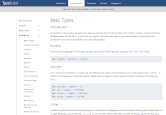 The TypeScript Handbook is a comprehensive guide to the TypeScript language. It covers basic types, variable declarations, interfaces, classes, functions, generics, enums, type inference, type compatibility.
The TypeScript Handbook is a comprehensive guide to the TypeScript language. It covers basic types, variable declarations, interfaces, classes, functions, generics, enums, type inference, type compatibility.
Later sections examine advanced types, symbols, iterators and generators, modules, namespaces, namespaces and modules, module resolution, and declaration merging. The final sections of the book tackle JSX, decorators, mixins, triple-slash directives, type checking JavaScript files, and utility types.
The book is published under the Apache License 2.0.
There’s a GitHub repository available.
4. TypeScript Succinctly by Steve Fenton
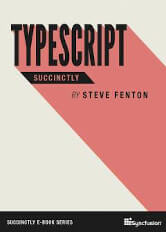
Chapters cover:
- Concepts in TypeScript.
- Visual Studio.
- Type Safety.
- Creating New Modules.
- Loading Modules.
- Working with Existing JavaScript.
- Unit Testing with TypeScript.
- Summary.
- Appendix A: Alternative Development Tools.
- Appendix B: TypeScript Command Line.
- Appendix C: External Resources.
This book is not published under an open source license.
5. Essential TypeScript by Jess Chadwick
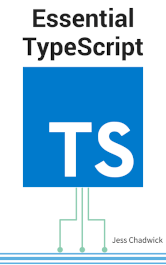 Essential TypeScript strives to teach the reader everything they need to know in order to create full-fledged JavaScript applications using the TypeScript programming language, starting by revisiting some JavaScript fundamentals and proceeding all the way to demonstrating how to convert an entire existing JavaScript codebase to take full advantage of what TypeScript has to offer.
Essential TypeScript strives to teach the reader everything they need to know in order to create full-fledged JavaScript applications using the TypeScript programming language, starting by revisiting some JavaScript fundamentals and proceeding all the way to demonstrating how to convert an entire existing JavaScript codebase to take full advantage of what TypeScript has to offer.
Starting with the basics and fundamental ECMAScript 2015 features that TypeScript expands upon, the author shows you all the ways that TypeScript allows you to bring your JavaScript development to the next level.
The book explains the features TypeScript adds to JavaScript rather than explaining the fundamentals of JavaScript itself. If you’re unfamiliar with JavaScript, we recommend you read our recommended free JavaScript books.
There’s also a GitHub code repository
All books in this series:
| Free Programming Books | |
|---|---|
| Ada | ALGOL-like programming language, extended from Pascal and other languages |
| Agda | Dependently typed functional language based on intuitionistic Type Theory |
| Arduino | Inexpensive, flexible, open source microcontroller platform |
| Assembly | As close to writing machine code without writing in pure hexadecimal |
| Awk | Versatile language designed for pattern scanning and processing language |
| Bash | Shell and command language; popular both as a shell and a scripting language |
| BASIC | Beginner’s All-purpose Symbolic Instruction Code |
| C | General-purpose, procedural, portable, high-level language |
| C++ | General-purpose, portable, free-form, multi-paradigm language |
| C# | Combines the power and flexibility of C++ with the simplicity of Visual Basic |
| Clojure | Dialect of the Lisp programming language |
| ClojureScript | Compiler for Clojure that targets JavaScript |
| COBOL | Common Business-Oriented Language |
| CoffeeScript | Transcompiles into JavaScript inspired by Ruby, Python and Haskell |
| Coq | Dependently typed language similar to Agda, Idris, F* and others |
| Crystal | General-purpose, concurrent, multi-paradigm, object-oriented language |
| CSS | CSS (Cascading Style Sheets) specifies a web page’s appearance |
| D | General-purpose systems programming language with a C-like syntax |
| Dart | Client-optimized language for fast apps on multiple platforms |
| Dylan | Multi-paradigm language supporting functional and object-oriented coding |
| ECMAScript | Best known as the language embedded in web browsers |
| Eiffel | Object-oriented language designed by Bertrand Meyer |
| Elixir | Relatively new functional language running on the Erlang virtual machine |
| Erlang | General-purpose, concurrent, declarative, functional language |
| F# | Uses functional, imperative, and object-oriented programming methods |
| Factor | Dynamic stack-based programming language |
| Forth | Imperative stack-based programming language |
| Fortran | The first high-level language, using the first compiler |
| Go | Compiled, statically typed programming language |
| Groovy | Powerful, optionally typed and dynamic language |
| Haskell | Standardized, general-purpose, polymorphically, statically typed language |
| HTML | HyperText Markup Language |
| Icon | Wide variety of features for processing and presenting symbolic data |
| J | Array programming language based primarily on APL |
| Java | General-purpose, concurrent, class-based, object-oriented, high-level language |
| JavaScript | Interpreted, prototype-based, scripting language |
| Julia | High-level, high-performance language for technical computing |
| Kotlin | More modern version of Java |
| LabVIEW | Designed to enable domain experts to build power systems quickly |
| LaTeX | Professional document preparation system and document markup language |
| Lisp | Unique features - excellent to study programming constructs |
| Logo | Dialect of Lisp that features interactivity, modularity, extensibility |
| Lua | Designed as an embeddable scripting language |
| Markdown | Plain text formatting syntax designed to be easy-to-read and easy-to-write |
| Objective-C | Object-oriented language that adds Smalltalk-style messaging to C |
| OCaml | The main implementation of the Caml language |
| Pascal | Imperative and procedural language designed in the late 1960s |
| Perl | High-level, general-purpose, interpreted, scripting, dynamic language |
| PHP | PHP has been at the helm of the web for many years |
| PostScript | Interpreted, stack-based and Turing complete language |
| Prolog | A general purpose, declarative, logic programming language |
| PureScript | Small strongly, statically typed language compiling to JavaScript |
| Python | General-purpose, structured, powerful language |
| QML | Hierarchical declarative language for user interface layout - JSON-like syntax |
| R | De facto standard among statisticians and data analysts |
| Racket | General-purpose, object-oriented, multi-paradigm, functional language |
| Raku | Member of the Perl family of programming languages |
| Ruby | General purpose, scripting, structured, flexible, fully object-oriented language |
| Rust | Ideal for systems, embedded, and other performance critical code |
| Scala | Modern, object-functional, multi-paradigm, Java-based language |
| Scheme | A general-purpose, functional language descended from Lisp and Algol |
| Scratch | Visual programming language designed for 8-16 year-old children |
| SQL | Access and manipulate data held in a relational database management system |
| Standard ML | General-purpose functional language characterized as "Lisp with types" |
| Swift | Powerful and intuitive general-purpose programming language |
| Tcl | Dynamic language based on concepts of Lisp, C, and Unix shells |
| TeX | Markup and programming language - create professional quality typeset text |
| TypeScript | Strict syntactical superset of JavaScript adding optional static typing |
| Vala | Object-oriented language, syntactically similar to C# |
| VHDL | Hardware description language used in electronic design automation |
| VimL | Powerful scripting language of the Vim editor |
| XML | Rules for defining semantic tags describing structure ad meaning |
